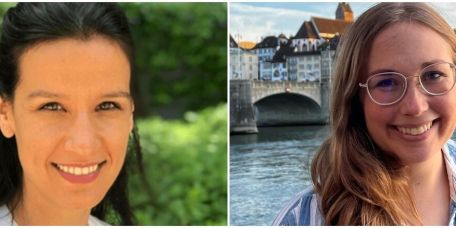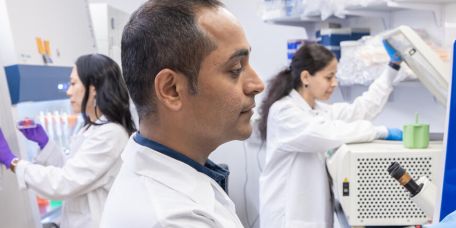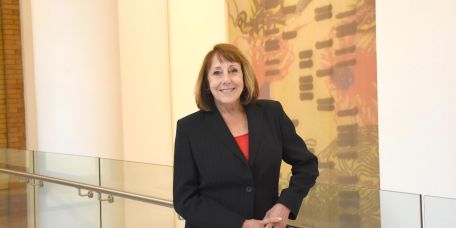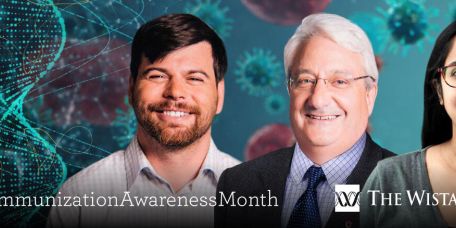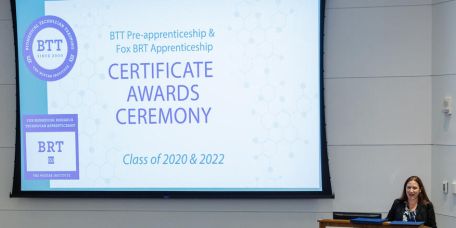The Wistar Institute
Unraveling the Ties That Bind: Epstein-Barr Virus and Multiple Sclerosis
A conversation with the Lieberman Lab delves into how EBV can trigger MS and potential therapeutic solutions that can be developed with this knowledge. Epstein-Barr virus (EBV) is ubiquitous, establishing lifelong infection found throughout the worl…
Exceptional Wistar Trainees Honored at 2022 Rugart Family Awards Ceremony
Dr. Laura Garcia Gerique, postdoctoral fellow in the Nefedova lab, and Sarah Offley, graduate student in Gardini lab, are winners of the 2022 Annual Rugart Family Awards. This annual event, sponsored by the Rugart Family honors the late Karl F. Ruga…
Wistar Scientists Find Gut Microbe Byproduct Drives Antitumor Immunity
The team identified the metabolite TMAO drives immune activation in the tumor microenvironment and boosts response to immune checkpoint blockade therapy in pancreatic cancer. Rahul S. Shinde, D.V.M., Ph.D., Assistant Professor in the Immunology, Mic…
The Wistar Institute Welcomes Michele A. Schiavoni, New Vice President of Communications & Marketing
PHILADELPHIA—(September 8, 2022)—The Wistar Institute is pleased to announce the appointment of Michele A. Schiavoni, M.S., as Vice President of Communications & Marketing, in a central leadership role that will bolster the visibility of the Ins…
The Wistar Institute and Jubilant Therapeutics Inc. Find PAD4 Inhibition in Neutrophils Halts Cancer Progression and Metastasis
PHILADELPHIA — (Sept. 7, 2022) — Researchers in the laboratory of Yulia Nefedova, M.D., Ph.D., at The Wistar Institute and collaborators at Jubilant Therapeutics Inc. have uncovered a novel mechanism by which protein arginine deiminase 4 (PAD4) in n…
Advancing Scientific Enterprise at Wistar’s Vaccine and Immunotherapy Center
With just over a year at The Wistar Institute under their respective scientific belts, innovator-scientists Amelia Escolano, Ph.D., and Daniel Claiborne, Ph.D., have been pushing the scientific envelope in Wistar laboratories using mouse models to p…
A Wistar Journey Through the Past, Present, and Future of Immunization Work
Vaccines are a crucial public health tool in its’ arsenal against diseases. Resurgences of diseases long thought eradicated are popping up decades later in sewage waters here and abroad, and we’ve witnessed what the impact of war has on countries wh…
Looking Inside the Gut for Answers to Long-COVID
This Q&A offers a behind the science peek into some of the long-term effects of COVID on the body influenced by the gut microbiome. In a paper published in JCI Insight, Mohamed Abdel-Mohsen, Ph.D., associate professor in The Wistar Institute Vac…
Congratulations to the 2022 BTT Program and Fox BRT Apprenticeship Graduates!
On August 4, The Wistar Institute hosted a ceremony celebrating the 2022 graduates of the Biomedical Technician Training (BTT) Program and Fox Biomedical Research Technician (BRT) Apprenticeship. The hybrid event kicked off with a welcome by Dario A…
Rahul Shinde, D.V.M, Ph.D., Receives Pancreatic Cancer Action Network Career Development Award
The Pancreatic Cancer Action Network announced that Rahul S. Shinde, D.V.M., Ph.D., Assistant Professor in the Immunology, Microenvironment & Metastasis Program of Wistar’s Ellen and Ronald Caplan Cancer Center, was bestowed the Pancreatic Cance…

